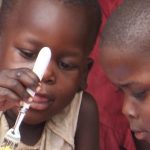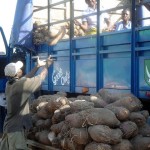IFPRI’s work in providing cutting-edge research on food and nutrition security has long depended on strategic partnerships with donors, universities, research organizations, and others around the world. One of the Institute’s key collaborators is the United Kingdom’s Department for International Development (DFID), which has served as a strategic and collaborative donor and partner to IFPRI for more than 30 years.
Highlights of IFPRI and DFID Partnership
For more than 40 years, the International Food Policy Research Institute (IFPRI) has been providing cutting-edge research and policy options on food and nutrition security to partners in donor and recipient countries around the world.
Pro-poor Growth and Investment in Lagging Rural Regions of Ghana and Viet Nam
The purpose of this line of research was to understand the role of agriculture in development, and how to achieve economic growth that benefits poor people in the most impoverished regions. To this end, and with support from BMZ and in partnership with the University of Hohenheim, IFPRI built regionalized economic models for Ghana and Viet Nam to evaluate the effectiveness of various development strategies. The work also involved training Ghanaian and Vietnamese collaborators on economy-wide modeling, and coordinating outreach and dissemination of results at the national and international levels.
Strategic Investment Planning to Improve Growth and Reduce Poverty in Africa
In 2004, BMZ was one of the first organizations to partner with IFPRI in supporting the NEPAD Secretariat and the implementation of CAADP. BMZ’s partnership allowed IFPRI, between 2004 and 2007, to prepare a roadmap to guide the CAADP implementation process, establish the program’s credibility among development partners, and facilitate the adoption of the CAADP agenda by more than 20 African countries and by regional economic communities. From 2008 to 2011, IFPRI assisted the NEPAD Secretariat and regional economic communities in implementing and advocating for the CAADP agenda at the regional, sub-regional, and national levels. IFPRI also helped build the capacity of national teams and experts to lead the analytical work.
Innovation in Insurance: Managing the Risky Business of Weather
On March 29-30, 2017, the Chicago Council on Global Affairs will host the Global Food Security Symposium in Washington, D.C. IFPRI has been helping design and evaluate index insurance products to aid farmers in mitigating the impact and managing the risks associated with severe weather and crop loss.
The Global Hunger Index
To rank countries and illustrate trends in hunger worldwide, IFPRI, Concern Worldwide, and Welthungerhilfe developed the Global Hunger Index (GHI), which captures four indicators of hunger: undernourishment, child wasting, child stunting, and child mortality. Using data from the Food and Agriculture Organization of the United Nations (FAO), the World Health Organization (WHO), and UNICEF, the index ranks countries on a 100-point scale, with 0 being the best score (no hunger) and 100 being the worst. The GHI is updated annually to track progress. By highlighting this information, the index serves as a tool for mobilizing political will and promoting effective policies to combat hunger. For more than a decade, the GHI has helped to increase country accountability in order to reduce hunger and undernutrition.
- 1
- 2
- 3
- …
- 14
- Next Page »




